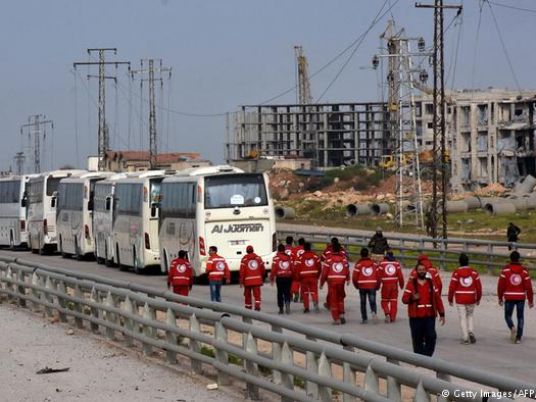
Ten buses carrying people from rebel-encircled towns headed for government-held Aleppo on Friday after waiting 48 hours at a staging area where 126 people were killed last weekend in a suicide bombing.
At the same time, five buses carrying rebels and their relatives from towns near Damascus headed for the rebel-held Idlib province, according to the Britain-based Syrian Observatory for Human Rights.
Syria's state-owned news channel Ikhbariyah also reported on the resumption of the twin evacuations, part of a swap deal among Syria's warring factions.
The exchange was delayed by a late rebel demand that the government of President Bashar al-Assad free 750 prisoners.
As the exchange resumed Friday, it was unclear whether those releases had taken place.
The Aleppo-bound evacuees from the rebel-besieged towns of Fuaa and Kafraya in northwest Syria had waited west of Aleppo at Rashidin, where 68 children from the same towns were among the victims of last Saturday's bombing.
On Thursday in Geneva, the UN special envoy for Syria, Staffan de Mistura, said the suicide attackers had disguised themselves as aid workers.
Mattis: Syria still has 'some' chemical weapons
Visiting Israel on Friday, Pentagon chief Jim Mattis told reporters there was "no doubt" that Syria had retained some chemical weapons despite a 2013 deal that supposedly saw the country rid itself of its entire stockpile.
"I can say authoritatively that they have retained some," said Mattis. "It's a violation of the United Nations Security Council resolutions … and is going to have to be taken up diplomatically."
Asked whether the Syrian military had moved its combat aircraft to a Russian base in Latakia, Mattis said: "They have dispersed their aircraft, no doubt. They have dispersed their aircraft in recent days."
The apparent movement of Syrian aircraft follows the recent US missile strike ordered by President Donald Trump against a Syrian airbase implicated by the US in an alleged chemical attack on a rebel-held town of Khan Sheikhun on April 4.
That attack in Idlib province left 87 dead, including many children.
Israeli Defense Minister Avigdor Lieberman, who also attended Friday's press conference alongside Mattis, declined to comment on reports that Israel believed Syria still held chemical weapons, amounting to between one ton and three tons.
Sarin or similar toxin
On Wednesday, the global chemical arms watchdog, the Organization for the Prohibition of Chemical Weapons (OPCW), said it had "incontrovertible" test results showing that sarin gas or a similar toxin had been used.
Russia, one of Assad's closest allies, has sought to clear his regime of blame and sought a new probe into the killings.
Assad has strongly denied involvement and accused Syria's opposition of trying to frame his government.
Civilian suffering continues
In Geneva on Thursday, the UN's chief humanitarian adviser for Syria, Jan Egeland, said front lines had shifted in Syria but civilian suffering had "remained the same."
Of nearly 5 million Syrians living in besieged or hard-to-reach areas, aid agencies had only been able to reach 564,000 this year, Egeland said.




